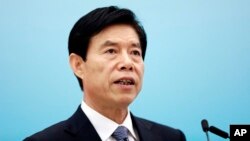China said Sunday that it will not initiate a trade war with the United States, but vowed to defend its national interests in the face of growing American protectionism.
"There are no winners in a trade war, and it would bring disaster to our two countries as well as the rest of the world," Minister of Commerce Zhong Shan said at a briefing on the sidelines of China's annual parliamentary session.
"China does not wish to fight a trade war, nor will China initiate a trade war, but we can handle any challenge and will resolutely defend the interests of our country and our people," he said.
It was Beijing's latest statement on "problems in Sino-U.S. economic trade and cooperation," alluding to President Donald Trump's plan to impose heavy tariffs on imported steel and aluminum. The U.S. leader said Thursday that he was slapping tariffs of 25 percent on imported steel and 10 percent on aluminum, temporarily exempting big steel producers Canada and Mexico.
Chinese leaders have threatened in the past to retaliate against raised trade barriers, but have yet to take direct action following Trump's announcement.
Citing Chinese researchers, Zhong said the U.S. has been overstating its trade deficit with China by about 20 percent every year. He gave no details on how this figure was reached, but the U.S. and Chinese governments generally report widely differing trade figures because Beijing counts only the first port to which goods go instead of their final destination.
The U.S. reported a $375 billion deficit with China last year, so a 20 percent reduction would still be among the largest trade gaps that the U.S. has with any country.
Zhong blamed the trade imbalance in part on controls over U.S. high-tech exports to China, repeating a Chinese claim that Washington could narrow its trade deficit if it allowed China to buy more "dual use" technology such as supercomputers and advanced materials with military applications.
U.S. officials have said such sales would make up only a few percent of the deficit while possibly threatening American national security.
The Trump administration earlier approved higher tariffs on Chinese-made washing machines, solar modules and some other goods, prompting Beijing to accuse Washington of disrupting global trade regulation by taking action under U.S. law instead of through the World Trade Organization.
Liu He, Chinese President Xi Jinping's top economic adviser, visited Washington earlier this month in an attempt to smooth strained ties.
Zhong said China would continue to "relax market access" to China and said China would also attach greater importance to intellectual property right, another point of tension with the U.S.
China absorbed $136.3 billion in foreign investment last year. The country has long been among the top global destinations for investment, but foreign enthusiasm is cooling. Surveys by business groups show companies are shifting emphasis to other Asian economies seen as more profitable or less restrictive.
"We have noticed that some foreign-funded businesses have complained about China's investment environment," Zhong said. "The fact that they have complaints indicates that they are still paying attention to China's development and have confidence in China's market."
The commerce minister reiterated Premier Li Keqiang's promise on Monday to liberalize the manufacturing industry and expand the opening up of sectors such as medical care, education and new energy vehicles. Specific details were not given, but Zhong pledged to give equal treatment to domestic and foreign businesses alike while continuing to curb "irrational overseas investment" from within China.
China Minister Says Trade War with US Would Be 'Disaster'

BEJING —